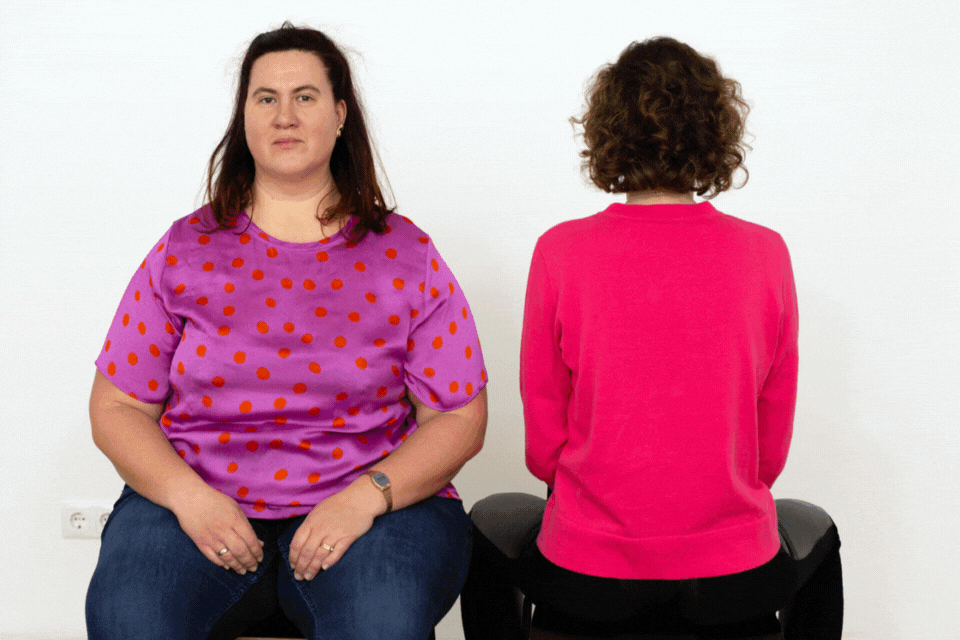
Similar Stories
Fajgerné Dudás & Horváth Lóczi
16 February - 24 March, 2023
Curator: Noémi SZABÓ
The strategy of motherhood are varies from person to person but as a matter of fact they are similar because being a mother/ a parent is turning you entire life to a different state. This experience is changing your whole personality, moreover it forms your connection to society and creative practice. By taking care of childrens you can learn this “maternal thinking” which is a difficult, complex, it means that you need to balance between being an artist, a creative person and dealing with the everyday life of taking care of your family. Fajgerné Dudás Andrea and Horváth Lóczi Judit decided to introduce this special intellectual and physical state of mind through their personal experiences. They both belong to the same generation and they are both mothers. Even though they paint in a really different way, they have both been interested in women's art for years. They are connected differently to the historian feminist aspects, instead of program-like tendency they are affected by empirical practical experiences. Beyond emancipation they are committed next to the traditional women’s roles: they live in a marriage, they raise their children, do the housework, they brilliantly deal with time meanwhile in their art they express along their feminine and motherhood identity a deep criticism about the patriarchal framework of society.
The exhibition called Similar Stories című kiállítás egy hosszú folyamat eredményeként jött létre: egyfelől az anyai lét primér, többéves tapasztalatából merít, majd az elbeszélők szubjektív élményét a képzőművészet eszközével tematizálja közösségi üggyé. Fajgerné Dudás és Horváth Lóczi közös beszélgetéseik során hét olyan fogalmat jelöltek ki, amely az általuk megélt anyai identitás fontos problémáiról, kimond(hat)atlan félelmeiről és aggályairól, a szülői szerepekről, illetve a művészeti praxis és a karrier összeegyeztethetőségének kereséséről, valamint a speciális „anyai gondolkodás” jellegzetességeiről indít dialógust: tabuk és klisék nélkül, mélyen pszichologizáló, önreflexív és intim módon. A Hasonló történetek című kiállítás maga is kísérlet: milyen kapcsolódási pontokat vagy épp hangsúlybeli eltéréseket eredményez a téma két radikálisan eltérő vizuális nyelvezettel történő feldolgozása? A két művész tudatos döntése nyomán a több hónapos alkotói folyamat során egyszer sem tekintették meg egymás alkotásait, az önmaguk számára felállított alkotói szabályrendszer (kötött tematika, meghatározott képméretek) miatt létrejött kölcsönös kompromisszum pedig a kiállítás fontos tartalmi aspektusává vált
The artist made a conscious decision that they will not inspect the others' work during the several months of creative process, they created a certain system of rules (themes, defined sizes of the paintings) which established a mutual compromise, it became the exhibitions important content aspect. How can creative women who have the profound vocation, belong to the european culture can process the excruciating feeling of constant remorse which is parallel with the mother role? When is that point coming when nothing really matters and how the patriarchally judgemental society takes it? What if they were born as men? What new levels can experienced from fatigue and exhaustion by the woman who is raising a child? Do women have prejudice against themselves in the motherhood community, whatsoever where are the borders of female empathy? How can we deal with the mental and intellectual load coming from a sense of professionalism for example when you are getting ready for an exhibition? How does privacy dissolve and transform when you become a mother? Those questions can be really familiar to all who became a mother, Fajgerné Dudás Andrea and Horváth Lóczi Judit’s micro histories can provide a dissolution mirror to all of us and meanwhile they hand their own experiences, knowledge and deeper feelings, they address to faith, feminine roles, their complex identity.
Noémi Szabó, art historian, curator of the exhibition

